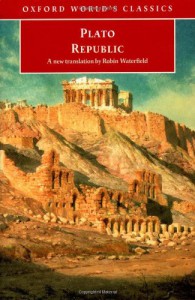Currently reading
Republic

The writings of Plato have been one of the cornerstones of Western thought for two and a half millennia used for both secular and religious purposes, sometimes not as he intended. Republic is one, if not the, most famous piece of Plato’s philosophical/political writings and the translation by Robin Waterfield for Oxford World’s Classics adds to the debate that surrounds it.
During a thorough 60+ page introduction to Plato’s text, Waterfield most significant translation is “morality” instead of “justice” for the Greek word dikaiosune because of the definition provided by Aristotle of the word. With this word decision and with her discussion of Plato’s complete disregard to politics, Republic turns from a work of political theory into one of philosophy concerned about the improvement of an individual’s life and not that of a Greek polis. Using the cultural terms and norms of his time, Plato sets out to express his belief that individuals can improve and better themselves outside the communal structure of Greek life. This was a radical notion given that individualism—especially as we know it today—was not a part of respectable Greek political life, the individual’s life was bound up in the community and if they went off on their own it was dangerous to the civic order and with the relationship with the gods (the charge against Socrates).
While Plato’s overall thesis is thought-provoking, some of his supporting arguments via mathematics and his lack of details about how to improve one’s morality and thus goodness are detriments to Republic’s overall quality. Although later individuals, in particular early Christian fathers, would supplement Plato with their own supporting evidence for those in the 21st Century these elements can be stumbling blocks. Even though Waterfield’s translation provided to be very readable and her notes beyond satisfactory, the constant flipping to the back of the book to read them and provide myself with the context to what she was saying while at the particular place in the text was somewhat unhelpful but footnotes at the bottom of the pages might have been worse.
Republic is one of the most significant pieces of Western literature and whether you approve of Waterfield’s translation or not, it is a very good was to look at a piece of text long-thought to mean one thing and see it as something completely different.





 3
3
 2
2
